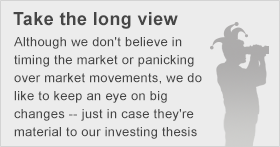
The Dow Jones Industrial Average (^DJI 0.51%) was 50 points higher in early afternoon trading after the Census Bureau released figures showing that new home sales rebounded strongly in April after a disappointing March.
This week also marked the five-year anniversary of the passage of the CARD Act, sometimes referred to as the Credit Cardholders Bill of Rights.
The anniversary passed with little fanfare, and that's a shame, as the legislation has been a resounding success for consumers and for investors.
What is the CARD Act, and why is it such a great piece of legislation?
The CARD Act aimed to accomplish two primary tasks, and it has succeeded in both objectives.
No. 1: Unfair and abusive practices
First, the law made many unfair and abusive practices illegal and created a framework to enforce those provisions. Before the legislation, banks had some pretty shady practices in their marketing, fee structures, and general attitude toward instituting additional charges for the scantest of reasons.

President Barack Obama nominating Richard Cordray to lead the CFPB.
The Consumer Financial Protection Bureau, or CFPB, discovered instances in which banks charged exorbitant fees for payments received on a Monday, when the actual due date was on the preceding Sunday (and the bank was closed).
To further squeeze every dime out of the cardholder, banks would also increase the card's interest rate to upward of 36% for a single late payment, even if that payment was just one hour late.
And perhaps the worst practice of all, many banks instituted a "universal default" clause into their cardholder agreements. These clauses stated that the bank could raise the cardholders' interest rate to the legal maximum, 36%, even if the individual never missed a payment. The default would be triggered by the bank monitoring the consumer's credit report -- if the score dropped below a certain threshold, that's all it would take to jack up the interest rate.
No. 2: Murky fees that don't make sense
Second, the law forced credit card issuers to disclose fees, interest rates, and other costs in a much more transparent and accurate way.

The most obvious change for most consumers is a far cleaner, simpler, and easier to understand format of the agreements that lay out the costs of using the credit card. The fonts are bigger, the wording isn't lawyer-speak, and the information is accurate.
The law also now requires -- and it's insane to learn that banks were not doing this anyway -- that card issuers actually determine the borrower's ability to repay the debt. It's truly shocking that the single most fundamental tenet of lending must be legislated, and it speaks to the pervasive malfeasance in the culture of these institutions.
Attention, shady bank executives! This whole "ethical practices" thing is actually good for business!
The results of these two simple changes have been profound. The CFPB found that the act is saving consumers $4 billion annually.
Another study found that borrowing costs declined by 1.7% for the average credit card user. For those with credit scores below 660, borrowing costs declined 5.5%. That totals $12.6 billion in annual savings for all U.S. card holders.
This is obviously good news for consumers, but it's also great for investors. Most obviously is that every year there is $12.6 billion that would have gone to interest payments now available for spending in the economy. That's a win for everyone.
And even for bank investors (who may be thinking about all that lost revenue at this point), the CARD Act is a good thing.

Take Bank of America (BAC +1.06%), for example. Just last month the bank was ordered to pay $727 million in consumer relief to customers for illegal credit card practices. The bank misled consumers with deceptive marketing, enticing them to enroll in expensive and nonbeneficial payment protection programs.
Many of the 1.4 million consumers affected were told that they were opting in just to receive more information, when in fact the bank was enrolling them for the $13-per-month service.
Bank of America investors should be thrilled that the institution is finally being held accountable. This is about long-term viability, not a temporary blip in the stock's price on the news.
Bank of America has been brutalized in the court of public opinion since the financial crisis, primarily because of self-inflicted wounds such as this. For BofA to regain its place at the top of U.S. banks, it must end these unethical practices.
Was the profit generated from this marketing effort worth the nearly $750 million penalty and the damage to public opinion? Are you comfortable investing your hard-earned money, your retirement, in a company willing to trick consumers in this way?
Long-term investors need to know that Bank of America is running a clean shop. This legislation is an amazing new tool to ensure that happens.
Legislation done right

President Obama signing the CARD Act into law on May 22, 2009.
More often than not, those in the investing world cry foul at the costs of regulation and legislation in the business world. Many lean toward a laissez faire approach, trusting the markets to weed out the bad players.
The reality in the murky world of finance is, unfortunately, that the market can't do this alone. In this case, the CARD Act is exactly what consumers, business, and investors needed.
The banking business model is robust enough to survive and thrive without tricking consumers out of nickels and dimes, without deceptive marketing, and without abusive practices.
As both a cardholder and investor in banks, I think we should all take a moment this holiday weekend and be thankful for a very successful piece of legislation, the Credit Card Accountability Responsibility and Disclosure Act of 2009.
For more business and investing insights, Click here to Like Jay on Facebook




